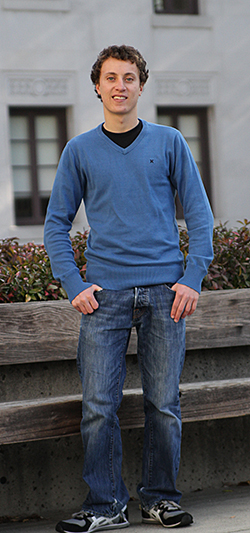Oxford-bound
Graduating senior Daniel A. Price, a double major in bioengineering and electrical engineering and computer sciences with a minor in physics, was selected as one of this year’s Rhodes Scholars. Next fall at Oxford University, Price will pursue research in medical diagnostic equipment. Here he tells us more about his studies, his research and future plans.

Daniel A. Price (Photo by Daniel McGlynn)
When you were growing up, were you always interested in science and math? What drew you to engineering?
I went to a small high school in Grass Valley, California. We didn’t have any math teams or science clubs, but I did enjoy those classes. I always knew I wanted to be an engineer—my father is a civil engineer—but bioengineering wasn’t something that I settled on until I got to college.
What is it that interests you about the field?
I chose bioengineering initially because it seemed the most cutting-edge and the most likely to erupt in the coming decades. It took until I got here—and started taking classes and meeting professors and seeing what they were actually doing—that I felt like I had made the right choice, because there is a lot of really important work being done in the field.
You are probably pretty busy with a double major and a minor, but what are you working on now?
I’m working on medical imaging in the Berkeley Imaging Systems Laboratory with Dr. Steve Conolly. We are designing a new modality of imaging that we are calling magnetic particle imaging (MPI), which is similar to magnetic resonance imaging (MRI). We are building a lot of prototypes and testing a lot of theories on how to get better image resolution or better image contrast. I’ve also been leading a side project looking at a different imaging modality that combines magnetics and ultrasound. We call it magnetic acoustical imaging, and that was a proof of concept, just to see if it could be done.
What will you study at Oxford? Do you have any plans beyond that?
At Oxford, I would like to work on biomedical devices or biomedical imaging devices that are being clinically used in hospitals. I’m leaning toward working in industry. I want to be doing engineering, but I also want to serve as a collaborative presence between the business side of the company and medical professionals. I’m becoming more interested in the larger picture—like getting a device into practice—so I’m considering a business degree. I’ve been accepted to Harvard Business School. Also, I’ve never been to Europe, and I’m really looking forward to traveling in Ireland, Scotland and on the mainland.
